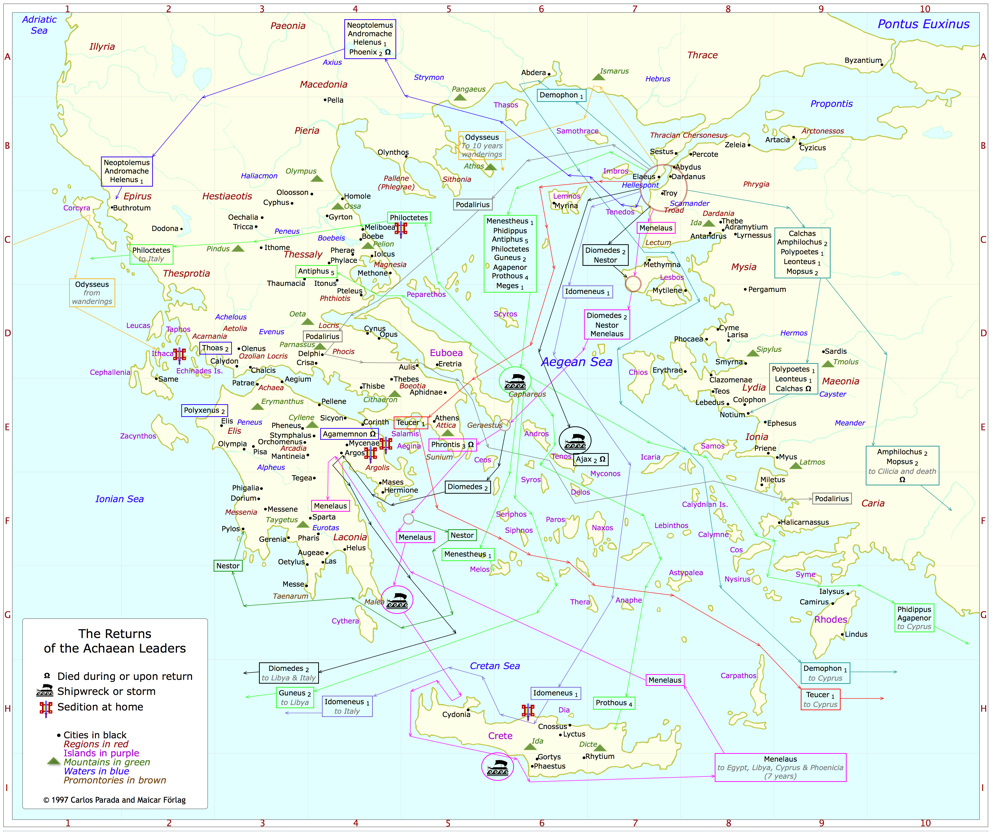The Wrath of Achilles
Tuesday, December 16, 2014
After the Events of the Iliad
As predicted, it
was shortly after I killed Hektor that my own time came to die. Before that
though, warriors of the Amazon came to fight with Troy. Their Queen Penthesilea
and I battled before I ultimately killed her. Next came Memnon of the Ethiopians.
Once again I came away victorious and was able to enter the city walls. At this
point Paris, the weakest of the Trojans, was able to accomplish what his
brother Hektor, the best of the Trojans, was not. Paris shot an arrow, with the
help of Apollo, which went directly through my heel, not dissimilar from Paris
wounding Diomedes. Remembering my childhood though, Thetis was only able to dip
everything but my heel into the river Styx, leaving that area vulnerable. This
was the only weakness I had, and perhaps a divinity like Apollo knew that. My
time had finally come and I was about to die inside the walls of Troy.
After my death my arms were given as a prize
after a competition between Odysseus and Ajax. Ajax was drove crazy by Athena
and eventually dies falling on his sword. Later on, Kalchas the Seer believes
Troy cannot be taken without the bow of Heracles, currently in Philoctetes
possession. He however was left on the island of Lemnos prior to the war after
fear of his snake bite. Odysseus goes to Lemnos and surprisingly finds
Philoctetes still alive, and they each return to Troy. Philoctetes actually
plays a significant role despite arriving 10 years into the war, as he is the
one to kill Paris. This led to Helen marrying Deiphobus, brother to Paris and
Hektor. This means that the war which was fought over her, due to the oath of
Tyndareus that the Greek leaders had sworn to, was essentially all for naught
as neither Paris nor Menelaos ended up being with Helen in the end.
This wasn’t enough
to sack the city though. Odysseus then captured Priam’s son Helenus. He had
been told that Troy could not fall without several things happening: 1)
Achilles son Neoptolemus must join the war, 2) The bones of Pelops (Agamemnon’s
ancestor) must be recovered, and 3) That Troy could not fall as long as it
possesses the Palladium (statue of Athena that protects the city. On a side
note, it’s interesting that a statue of a Goddess that sides with the Greeks
and protects several Greek heroes protects the city their trying to siege. Even
after achieving all the steps above, the Greeks still could not sack Troy.
In comes the
clever Odysseus who invents the idea of the wooden horse. The Greeks will build
a horse out of the scraps of their ships and have the best remaining fighters
hidden inside while the rest of the fleet sails away in full view of the Trojans
to ease any worries they may have about the horse. Though Cassandra, the prophetic
daughter of Priam, warns of the horse and to not bring it into the city, she
was cursed by Apollo to never be believed and nobody heeds her warning. Laocoon
also suspects something and Poseidon sent two snakes out of the sea to kill him
and his sons. The Trojans took this as a sign and immediately brought the horse
within their walls. At nightfall, the Greeks inside the horse snuck out, opened
the walls, and rampaged the city, killing everyone in sight, burning the city
to the ground. The ships that supposedly sailed away only rounded the island of
Tenedos and then returned and were allowed in when the walls were opened.
Several sacrilegious acts were committed by the Greeks during the sacking of
Troy, including Neoptolemus killing Priam at the altar of Zeus and taking
Hektor’s wife Andromache as his slave, Ajax (the lesser) raping Cassandra at
the altar of Athena, Odysseus throwing Hektor’s son Astyanax off the walls, and
burning alive Polyxena the daughter of Priam upon my tomb. Aineias was the only
Trojan to escape Troy along with his father and son, as he is prophesied to
found a new Troy, later to be known as Rome. Finally the Greek heroes head for
home, where their journeys are told in a later tale, specifically Odysseus and
his lengthy adventure in the Odyssey.
Subscribe to:
Posts (Atom)

